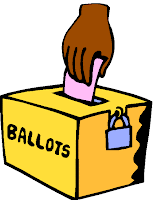"A vote is like a rifle; its usefulness depends upon the character of the user" - Theodore Roosevelt
During the election season "pro-voting" media content and conversations become almost unbearable trying to save "nonvoters" and "undecided" from everlasting torture in pit of Hell-ocracy, with everyone reading from the same bible.
Vote evangelists wants you to put a X beside something, thinks that everybody has to identify with a political party, and they keep skipping the first commandment of a democracy; participation. I was compelled - possibly touched - to write this with hope of relieving many "non voters" and "undecided" of their
"sins."
I will declare that I have not voted and will not vote until I have seen a candidate or a political party or a candidate that best represents and voices the issues that concerns me the most; which includes making comprehensive constitutional and governance reform a top level priority, environmental protection, equality and closing the income gap, until that appointed time I will withhold exercising this sacred right.
Many would immediately choose to castigate my choice, by automatically replying "If you don't use your right, you will lose it;" indeed this message intended to support citizen empowerment and participation cannot be used to justify irresponsible use or abuse of a your own rights. As I was I understand it, being a citizen in a democratic society, one has individual rights with mutually linked responsibilities. These rights ensure equality and justice for all regardless of what 'divides' us and the responsibilities are there to prevent us from infringing upon others and own rights.
Right to Vote & Its Responsibilities
If you do decide to cast your ballot then you've decided to engage in a single part of "the
process" that is linked to generations of hardships, fights, bloodshed, activism and political

willingness across the world. The right to have a say in who is allowed to govern locally or nationally is an awesome task and is constraint by 2 main responsibilities: become informed
and vote according to ones certain belief.
Therefore a vote should be respected as it symbolises a conscious decision in which the chosen person or party is indeed the best representation of one's belief at that moment with all issues factored in. Hence, to defy ones conscience and express his beliefs wrongly on a ballot is to behave as a irresponsible citizen and soil the sacredness of the vote. It is then safe deduce that one should not be chastised for being an informed "non-voter" or an "undecided" who has weighed all options and come to a conclusion, those who are to be shamed are the irresponsible voters who are the legions of "die-hearts" and "party loyalist" who are uninformed and their only certain belief is that "mi is born PNP or JLP."
A Dangerous Farce
Any political messaging that seeks to segregate or render a group of people as second class citizen must not be entertained and rebuked as dangerous to the social fabric of our nation.Many declared "nonvoters" and "undecided" receive flack; before, during and after election season because the prevailing belief is that "you have no say" and should not say anything because you don't vote. It is encouraged by our political leaders especially those who could benefit from higher turnouts, when they take to political platforms "looking votes" as disguised advocates of citizen involvement. The undue burden of being told how horrible not voting is, and how your allowing bad people to win.
It is a selfish practise to satisfy a politicians own shortcomings in their own inabilities to inspire
or motivate. Which is often discussed as an aside to blaming "nonvoters" and "undecideds" for the state of nations governance and democracy.
"The Process" and Participation
I, like so many other young, politically untethered Jamaicans are aware of the encryption and political warping since independence of what a democratic society truly represents in the 21st Century, then we can easily resist and counter the calls for "undecideds" and "non-voters" to "come off the fence" or "come into the yard," respectively.
We know that voting is not "the process" but apart of the process that includes:
- dialogue between state and civil society,
- advocacy, activism,
- volunteering,
- affecting/writing policy,
- old media/social media interactions,
- civil action/protest,
- by keeping yourself informed and the list continues.

Discussions must begin to focus on how we get people involved not just to lead towards a ballot box but create long-lasting positive changes in their society by speaking up and speaking out against bad governance.
Only voting every 5 years cannot and shouldn't be seen as participation. One doesn't affect govt policy or hold government accountable when its convenient for the government, you have to disrupt and intervene whenever there is need to tell the government: We want Fixed Election Dates! Leave the Goat Islands! or #FireFenton!
I don't vote and I don't feel any pressure to vote, because I know I've a well informed and certain decision to withdraw from voting, nothing separates me from someone voting PNP or JLP. I subscribe to my responsibility as a citizen of democratic state to participate otherwise until I decided or find necessary to vote.





